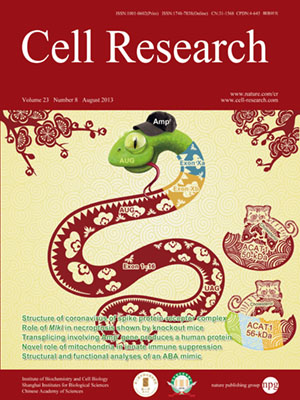
Volume 23, No 8, Aug 2013
ISSN: 1001-0602
EISSN: 1748-7838 2018
impact factor 17.848*
(Clarivate Analytics, 2019)
Volume 23 Issue 8, August 2013: 1007-1024
ORIGINAL ARTICLES
Production of ACAT1 56-kDa isoform in human cells via trans-splicing involving the ampicillin resistance gene
Guang-Jing Hu1,*, Jia Chen1,*, Xiao-Nan Zhao1,*, Jia-Jia Xu1, Dong-Qing Guo1, Ming Lu1, Ming Zhu1, Ying Xiong1, Qin Li1, Catherine CY Chang2, Bao-Liang Song1, Ta-Yuan Chang2 and Bo-Liang Li1
1State Key Laboratory of Molecular Biology, Institute of Biochemistry and Cell Biology, Shanghai Institutes for Biological Sciences, Chinese Academy of Sciences, Shanghai 200031, China
2Department of Biochemistry, Geisel School of Medicine at Dartmouth, Hanover, NH 03756, USA
Correspondence: Correspondence: Bo-Liang Li, Tel: +86-21-54921278; Fax: +86-21-54921279 E-mail: blli@sibcb.ac.cn*These three authors contributed equally to this work.
Trans-splicing, a process involving the cleavage and joining of two separate transcripts, can expand the transcriptome and proteome in eukaryotes. Chimeric RNAs generated by trans-splicing are increasingly described in literatures. The widespread presence of antibiotic resistance genes in natural environments and human intestines is becoming an important challenge for public health. Certain antibiotic resistance genes, such as ampicillin resistance gene (Ampr), are frequently used in recombinant plasmids. Until now, trans-splicing involving recombinant plasmid-derived exogenous transcripts and endogenous cellular RNAs has not been reported. Acyl-CoA:cholesterol acyltransferase 1 (ACAT1) is a key enzyme involved in cellular cholesterol homeostasis. The 4.3-kb human ACAT1 chimeric mRNA can produce 50-kDa and 56-kDa isoforms with different enzymatic activities. Here, we show that human ACAT1 56-kDa isoform is produced from an mRNA species generated through the trans-splicing of an exogenous transcript encoded by the antisense strand of Ampr (asAmp) present in common Ampr-plasmids and the 4.3-kb endogenous ACAT1 chimeric mRNA, which is presumably processed through a prior event of interchromosomal trans-splicing. Strikingly, DNA fragments containing the asAmp with an upstream recombined cryptic promoter and the corresponding exogenous asAmp transcripts have been detected in human cells. Our findings shed lights on the mechanism of human ACAT1 56-kDa isoform production, reveal an exogenous-endogenous trans-splicing system, in which recombinant plasmid-derived exogenous transcripts are linked with endogenous cellular RNAs in human cells, and suggest that exogenous DNA might affect human gene expression at both DNA and RNA levels.
10.1038/cr.2013.86
FULL TEXT | PDF
Browse 2661


